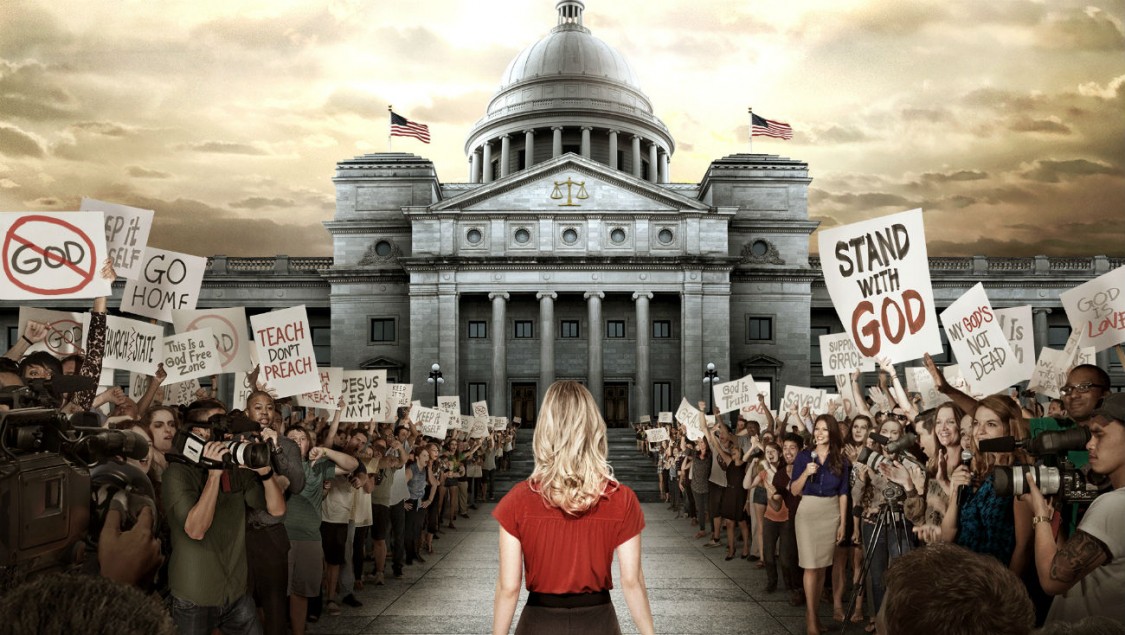Jack Jenkins is ThinkProgress’ Senior Religion Reporter and has a Master’s of Divinity from Harvard University.
Zack Ford is ThinkProgress’ LGBT Editor and an out and proud atheist who has spoken at various secular conferences nationwide. This week, they went to see the new film God’s Not Dead 2 together. This is a slightly edited version of the conversation that followed.
The story essentially revolves around Grace Wesley, a high school history teacher portrayed by Melissa Joan Hart who also happens to be a Bible-believing evangelical Christian. Grace is apparently an excellent teacher who cares deeply about her students — particularly Brooke Thawley (Hayley Orrantia), who is spacing out in class of late.
Grace eventually asks Brooke what’s wrong, and the two agree to meet at a coffee shop after school to discuss the teenager’s myriad of issues — namely, the recent death of her brother in an unspecified “accident.” When Brooke asks Grace how she is able to maintain such a chipper attitude in the face of life’s problems, the teacher eagerly replies “Jesus!”
Fast forward to a few days later, when Grace is leading her class in a conversation about Mahatma Ghandi and Martin Luther King, Jr. and their belief in nonviolent resistance. Brooke, newly converted to Christianity, raises her hand and asks whether King’s belief relates to the peaceful “love your enemy” teachings of Jesus Christ, beginning a dialogue in which student and teacher showcase their Christian faith in the most evangelical way possible: by reciting scripture from memory, completely out-of-context.
An unseen student then texts…someone…about the exchange, and suddenly Grace is brought up on charges before the principal and the school board for supposedly failing to adhere to the separation of Church and State. Grace refuses to apologize, thus transforming the film into a courtroom drama.
Never mind that Grace clearly has a strong case, and that siding against her would be absolutely absurd. Evangelical Christians are persecuted, dangit, and the audience needs to sympathize with Grace’s cause.
JJ: Actually, I want to talk about the film’s weird obsession with angry atheists. From start to finish, the entire movie is split into two concrete binary categories: people who believe in God and are thus naturally evangelical Christians, or atheists who are corrupt, unhappy, and quite literally hate evangelical Christians. The one exception is Grace’s dashing, J Crew gingham shirt-wearing lawyer (Jesse Metcalf), who is heavily implied to be a newly-converted evangelical Christian by the end of the film.
After originally being apathetic about religion and uninspired by Grace’s case, we see him at the end of the film reading Man, Myth, Messiah by Rice Broocks, who is one of the film’s several evangelicals who portray themselves as expert witnesses on Jesus.
JJ: Yeah, see, the weird thing here is that the courtroom drama eventually devolves into a debate over whether or not Jesus was an actual historical figure — an argument that is completely unnecessary to win Grace’s case, since she doesn’t need to prove whether Jesus existed in the literal sense to contend that Christianity and the Bible were directly relevant to the activism of Martin Luther King, Jr. (I don’t think anyone would dispute that it was).
ZF: I would think not! But that didn’t stop the evil atheist teacher from proudly testifying that if she taught “Letter from a Birmingham Jail,” she’d leave out King’s biblical references, because ew. Icky.
We atheists are replacing you liberal Christians, aren’t we? I’m okay with that.
I think your “boogie man” description is an apt reduction of the atheists’ portrayal in this film. If we haven’t driven home the point yet, all of the non-evangelical Christians in the film are apparently atheists and they’re all super evil and out to get those Christians. Honestly, I found this portrayal so goofy and shallow as to be unbelievable (pun intended)! Do evangelical Christians really believe we atheists are like that?














